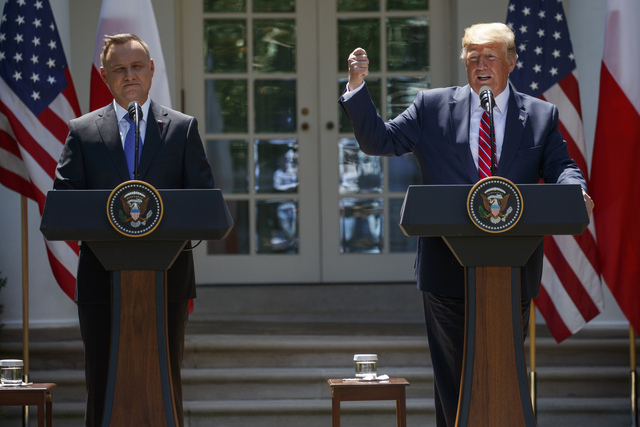 |
|
US President Donald Trump and Polish President Andrzej Duda hold a joint press conference at the White House Rose Garden on June 12, 2019, the first year anniversary of the North Korea-US Singapore summit. (AP/Yonhap News)
|
White House merely reiterates goal of FFVD, sending message of pressure and warning to China
Following the announcement that Chinese President Xi Jinping will be visiting North Korea on June 20–21, the American response has been relatively muted. US President Donald Trump refrained from commenting immediately, while the White House and the State Department sent messages containing both pressure and a warning about the North Korea-China summit while stressing the US’ oft-repeated goal of North Korea’s denuclearization. On June 17, the White House responded to press queries about Xi’s visit to North Korea by saying that the US’ goal is bringing about North Korea’s final and fully verified denuclearization (FFVD), something that it noted North Korean leader Kim Jong-un has already agreed to. As a general reiteration of the US’ position on North Korea’s denuclearization, this statement itself would not appear to contain anything new. But given current relations between the US and China — the two countries are in the middle of a trade war — underlining the goal of denuclearization can be seen as the US’ way of warning North Korea and China not to stray from the set path. The US State Department conveyed a somewhat more specific message to China. On Tuesday, the State Department told the press that the US was focusing on achieving the shared goal of North Korea’s FFVD in cooperation with the US’ partners, allies, and other permanent members of the UN Security Council, including China. The State Department said that the US and the international community had a shared understanding of what FFVD involves and what meaningful progress toward that goal would be and added that it would continue to work closely with its allies, partners, and permanent members of the UN Security Council, including China. By emphasizing that China, by virtue of its permanent seat on the UN Security Council, has a responsibility to implement sanctions resolutions against North Korea, the US was effectively pressuring it not to defect from the international coalition that’s putting pressure and sanctions on the North. With this response, said Cho Sung-ryul, a research consultant for the Institute for National Security Strategy, the US was “urging China not to take any foolish actions that would create obstacles for the denuclearization of the Korean Peninsula.” “Americans are likely to regard preparations for a China-North Korea summit as not helpful in moving North Korea in the direction desired by the US. They’ll see this as part of North Korea’s efforts to strengthen its position in the [denuclearization] negotiations,” said Wi Seong-rak, former South Korean ambassador to Russia. The US has been unable to resume dialogue with North Korea since their summit in Hanoi, and the US’ relations with China continue to deteriorate because of their trade war. As such, a meeting between China and North Korea is bound to be regarded as a nuisance by the US, Wi said. The press in the US and other countries seem to be closely following Xi’s visit to the North. Noting that Xi was visiting North Korea at a time when both the North and China are at odds with the US, the Washington Post concluded that the visit will go down as a diplomatic triumph for North Korean leader Kim Jong-un, who has been isolated since the dramatic failure of his denuclearization talks with US President Donald Trump this past February. The Washington Post added that China is the North’s most important ally and an economic lifeline for a country that’s under UN sanctions. What’s clear is that Trump’s calculations are complicated by Xi’s visit to North Korea. The visit is taking place shortly before the G20 summit, during which the US and China are expected to hold trade talks. Since last year, the Trump administration has maintained a policy of keeping its trade talks with China separate from the North Korean nuclear issue, but that policy has been cast into doubt by China’s push to link the two. By Kim Ji-eun, staff reporter Please direct comments or questions to [english@hani.co.kr]






